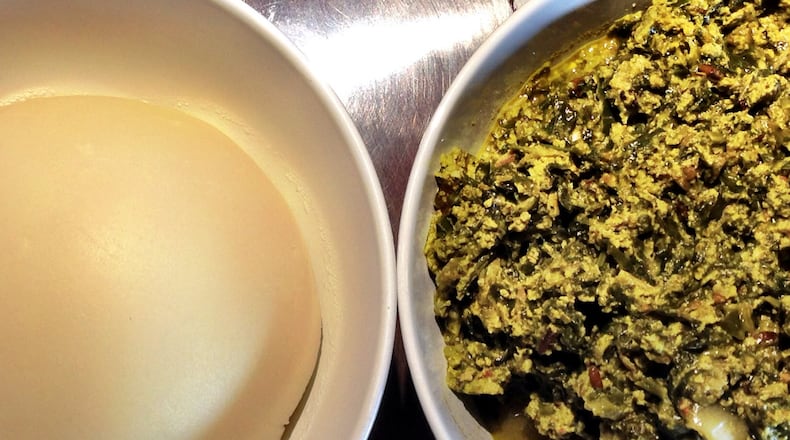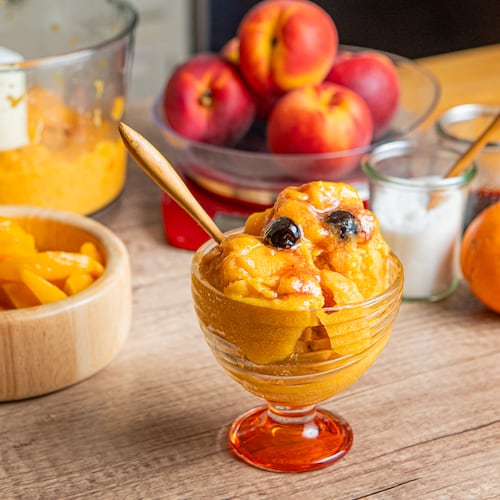At a weekend lunch in June, I walked into Cafe Songhai from the summer heat, slipped down into one of the cool, long booths, and decided to try something new.
Like many places that serve African food, or food of the African diaspora, the kitchen here will be happy to whip you up a plate of ripe plantains, sliced and fried to a light caramelized touch. But the menu also offers krakro, a fried lumpy dumpling made from mashed, overripe plantains cut with some flour and seasoning, a dish common in Ghana, but not on any menu I could remember ordering. Before the waitress walked away, she mentioned that the chicken gizzards were pretty good, too. Sure, why not?
She returned with a perfect little balance of lazy Saturday snacks. The krakro were the doughy, fried, mildly sweet treat that I’d hoped for, but the spicy gizzards, stewed down in a rich, red sauce, were a revelation. Like any gizzard, they were a chewy chunk of meat, but the stewing had made them just tender enough, giving the mash of peppers and onions clinging to them just enough time to bloom and linger in my mouth. I washed it down with a cold, cheap beer. Like the upbeat tune playing over the stereo, which sounded a little like a Rick James number reinterpreted by a Nigerian pop group, the result for me was both a little new but comfortingly familiar.
I’d hazard to guess that most American diners are, like me, a little more familiar with the cuisine of East Africa, probably the injera, wat and tibs of Ethiopia. Many people would probably even say they know nothing about the food of West Africa. They probably don’t realize that they’re more than familiar with dishes that have descended from the region: the plantains and curries of the Caribbean, the okra and fried gizzards of soul food joints, the jambalaya of Louisiana, and so on.
The menu at Cafe Songhai does a nice job of offering a detailed spread of the foods of West Africa, particularly dishes from Nigeria and Ghana, but also with some influence from Ivory Coast. This is the work of chef Matthew Ouoso. Though he was born in Ghana, Ouoso cooked in restaurants in London before landing here in the States less than a decade ago. He’s an affable presence in a hip fedora, happy to talk origin of the dishes he cooks and the ingredients that make them work, but you probably won’t see much of him. He’s been back in the kitchen on all of my visits, though on my last time, the waitress summoned him out to answer a few questions that she couldn’t.
You, too, may have questions. There are simple questions, like, should you order the jollof rice? The answer is no doubt yes, you should order the jollof rice, but this will prompt another question: Do you want your jollof with parboiled or jasmine rice? This is a distinction between national traditions. In Ghana, jollof is made with a thinner, more sturdy jasmine grain. Nigerian jollof rice is prepared with wider grains. The distinction may seem small, but the rivalry is intense and opinionated. (Just give “Nigerian jollof vs. Ghanaian jollof” a quick Google search.) I’d say, since you’re ordering from a Ghanaian chef, jasmine is the way to go. Your plate will arrive with a rich, but not overpowered plate of grains thick with savory, tomato umami.
Jollof is served here as part of an entree with stewed meat, your choice of beef, goat, chicken or fish, but I’d say you’re better off ordering a side dish and exploring more of the menu’s options.
There’s an extensive spread of West African stews served here that range from ayamase, a dark, green pepper stew popular in Nigeria, to aponkye nkrakra, a lighter, ginger-spiked concoction more popular in Ghana.
I’m fond of the spinach-based egusi soup, which takes a thick, smooth texture from the dried, ground seeds of melons. Like many other West African soups, the base here includes stock fish that add a layer of funkiness to the flavor and aroma. But Ouoso is reserved in his use of fishy flavor, and the effect is mild.
If you do order one of these stews, your waitress will gladly bring a large water bowl for you to wash your hands with, and a plate of airy, white fufu. That’s a mash of boiled yam meant to be picked off and used as a kind of culinary utensil, like folding up tibs with injera bread or beans with a tortilla. The water bowl is an especially nice touch, because you’ll be getting your hands dirty spooning up piles of spinach and strands of goat meat with your fufu.
The entree I’ll probably come back for, though, is Ouoso’s grilled tilapia. The fish is served whole and grilled so that the still-moist meat slips easily from the bony skeleton. He smears that with a peppery tomato sauce and piles it high with wilted strips of tomato, raw slivers of onions and a handful of spring lettuces. On the side, you’ll receive a ramekin of something deeply powerful, a dark hot sauce made from Scotch bonnet and habanero peppers cooked into a mash with Ouoso’s touch of house seasoning. Your lips will tingle long after you leave lunch, a happy reminder to come back soon.
CAFE SONGHAI
11 a.m.-10 p.m. Tuesdays-Thursdays; 11 a.m.-midnight Fridays-Saturdays; 11 a.m.-10 p.m. Sundays. 3380 Holcomb Bridge Road, Peachtree Corners. 470-359-2969, facebook.com/CafeSonghaiATL.
About the Author
The Latest
Featured




